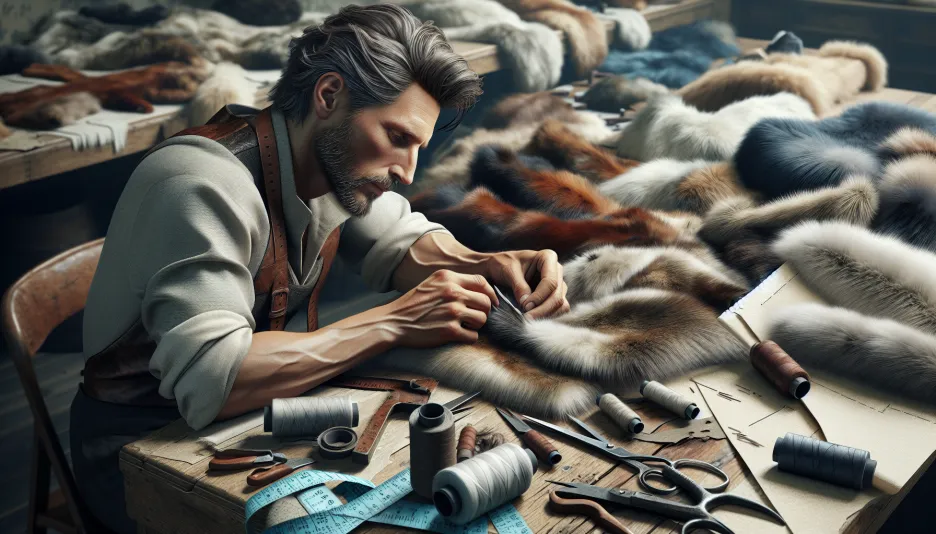- Salary statistics
- Fur model
Fur model salary
31 000 - 31 000 kr / month
Hantverksyrken
Salary progression Fur model

What Does it Mean to Work as a Fur Modeler?
Working as a Fur Modeler is a profession that combines artistic skill with technical precision. In this occupation, individuals work on creating and shaping fur garments, often collaborating closely with tailors and seamstresses. Tasks may involve design, pattern construction, cutting, and sewing of fur products. It requires a keen sense of aesthetics and details, as well as a solid knowledge of the material's properties.
Salary for a Fur Modeler
The average salary for a Fur Modeler is 31 000 kronor per month. For women in the profession, the average salary is slightly higher at 32 000 kronor. For hourly employees, the hourly wage is around 186 kronor, based on 166 working hours per month. Compared to previous measurements, the average salary has increased from 28 800 kronor, indicating a positive trend in the profession's salary level.
Education and Qualifications
Becoming a Fur Modeler requires a basic education in sewing and design, often with a focus on textiles and fashion. Many start with a high school education in crafts or design and then proceed to higher education in textile and fashion design. Practical experience is also highly valuable, and many Fur Modelers receive training through apprenticeships or internships at established ateliers.
Working Conditions and Environment
Working as a Fur Modeler often entails working in a creative environment, either in an atelier or workshop. The work can be both physically and mentally demanding, with a strong emphasis on details and precision. It may also involve long working hours, especially before fashion shows or collection launches.
Future Outlook and Competition
According to forecasts from the Employment Service, which have compared the profession with others in the same sector, the chances of finding work as a tailor and seamstress, and thus as a Fur Modeler, are slim. The five-year forecast indicates that demand is expected to remain unchanged, with an excess of qualified applicants. This means that competition for jobs can be tough, and it is important to stay updated on trends and techniques in the fashion industry.
What to Consider if You Want to Become a Fur Modeler
For those interested in becoming a Fur Modeler, it is important to have a passion for fashion and design, as well as a willingness to constantly develop skills. Building a strong network within the fashion industry can also be crucial, as well as staying informed about new techniques and materials. Creativity and attention to detail are crucial, as well as patience and precision.
Possible Benefits
Benefits in the profession can vary depending on the employer and employment conditions. In some cases, there may be opportunities for paid further education or courses in design and sewing. The opportunity to work in an inspiring and creative environment can itself be a major advantage for many.
- Education: High school education in crafts or design followed by higher education in textile and fashion design.
- Creativity: Important for creating aesthetically pleasing garments.
- Precision: A necessity for handling details and materials correctly.
- Future Outlook: Limited opportunities with an expected unchanged demand over five years.
In conclusion, the profession of Fur Modeler offers a unique opportunity to combine artistic talent with technical expertise in the fashion industry. Despite a challenging job market, there is potential for those willing to invest in their passion and continue to evolve in the field.
Salary distributed by age and sector
| Age | Base salary | Monthly salary | |
|---|---|---|---|
| Snitt | 31000 kr | 31000 kr |
| Age | Base salary | Monthly salary | |
|---|---|---|---|
| Snitt | 28300 kr | 28300 kr |
| Age | Base salary | Monthly salary | |
|---|---|---|---|
| Snitt | 28300 kr | 28300 kr |
| Age | Base salary | Monthly salary | |
|---|---|---|---|
| Snitt | 31000 kr | 31100 kr |
| Age | Base salary | Monthly salary | |
|---|---|---|---|
| Snitt | 31000 kr | 31100 kr |
| Age | Base salary | Monthly salary | |
|---|---|---|---|
| Snitt | 31900 kr | 32000 kr |
| Age | Base salary | Monthly salary | |
|---|---|---|---|
| Snitt | 28300 kr | 28300 kr |
| Age | Base salary | Monthly salary | |
|---|---|---|---|
| Snitt | 28300 kr | 28300 kr |
| Age | Base salary | Monthly salary | |
|---|---|---|---|
| Snitt | 32000 kr | 32000 kr |
| Age | Base salary | Monthly salary | |
|---|---|---|---|
| Snitt | 32000 kr | 32000 kr |
About the data
All information displayed on this page is based on data from the Swedish Central Bureau of Statistics (SCB), the Swedish Tax Agency and the Swedish employment agency. Learn more about our data and data sources here.
All figures are gross salaries, meaning salaries before tax. The average salary, or mean salary, is calculated by adding up the total salary for all individuals within the profession and dividing it by the number of individuals. For specific job categories, we have also considered various criteria such as experience and education.
Profession Fur model has the SSYK code 7531, which we use to match against the SCB database to obtain the latest salary statistics.
-

Musical instrument makers and other artisans
-

Instrument repairer, fine mechanics
Precision mechanics
-

Musical instrument makers and other artisans
-
Bakers and pastry chefs
-

Leather craftsmen and shoemakers
-

Musical instrument makers and other artisans
-

Tax Pressure in Kiruna Municipality - An Overview of Tax Rates and Economic Challenges
Thu, 23 May 2024 - 22:26







